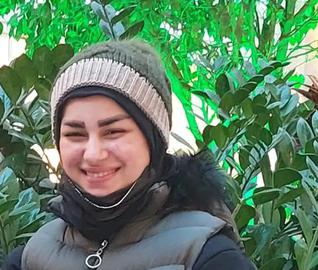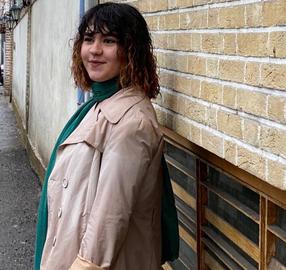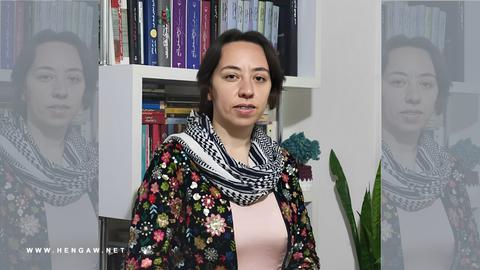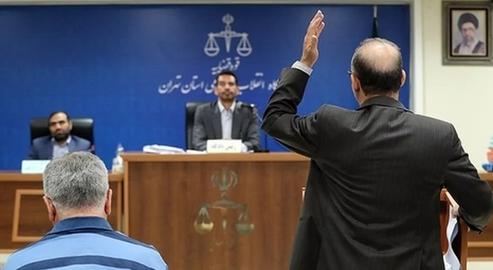On the afternoon of Saturday, February 5, 2022, Rokna News Agency released an horrific video detailing a recent so-called “honor killing” in Ahvaz, Khuzestan. A young man was seen walking in the Khashayar neighborhood of the provincial capital, holding his wife’s head in his hand.
According to initial reports, the man beheaded his 17-year-old wife at about 3pm on Saturday in the middle of the nearby Kasaei Square. The woman was said to have fled to Turkey a few months previously, but was later compelled to come home.
IranWire has since obtained more details about this tragedy. The woman’s name was Mona Heydari: one of thousands of female victims of patriarchal violence in Iran. She had also been subjected to child marriage: a growing, catastrophic and interlinked phenomenon that is still actively promoted and encouraged by lawmakers and officials in Tehran.
"Mona was 12 years old when the family forced her to marry her cousin Sajjad Heydari," a source close to the young woman's family told IranWire. "They have a three-year-old son. Mona had always been a victim of domestic violence. Every time she talked about her husband berating her, and [the possibility of] divorce, she’d say she was convinced she had to continue living for the sake of her child. But in the end, Mona dropped everything and ran away.
"There are two different narratives about Mona Heydari’s flight to Turkey. Some say that she met a Syrian man living in Turkey online, and on his promise to rid her of her difficult life, she left for Turkey with some money and gold. But the man left her there after taking it, and six months later Mona was forced to call her brother, saying she regretted it all and wanted to come home. Some other claim the person Mona left with was from her hometown, and had abandoned her afterward.”
The source added that Mona’s brother had repeatedly promised her she would not be harmed if she came back. "She was assured that she would not be under threat. But a few days after she returned to her husband's house, Sajjad and his own brother bound her hands and feet and beheaded her. Sajjad's brother wrapped Mona's naked body in a blanket, and Sajjad, with Mona’s head in his hand, went and walked down the street."
Kiomars Keshvari, the head of the Ahvaz police headquarters, announced that Sajjad had been arrested on suspicion of murder. The motive, he claimed, had been “family problems”. The city prosecutor Abbas Hosseini Pooya also gave a preliminary assessment of what had happened: “This young woman fled to Turkey and from there, sent some pictures back to her husband. These images provoked her husband's feelings."
Child Marriage and “Honor Killings” in Iran
There are few reliable datasets on the extent of child marriages or so-called “honor killings” in Iran. But non-exhaustive figures released by the Statistical Center last year indicate the former is becoming more prevalent, with at least 100 child marriages under the age of 15 registered every 24 hours. Supposedly honor-related murders of women and girls by their partners or relatives also periodically make headlines in different parts of Iran.
Atefeh Barvaieh, an Iranian-Arab civil rights activist, reported in mid-December that according to her own research, at least 60 women had been killed in Khuzestan over the past two years for reasons of perceived "honor". Among the victims, she said, were 10- to 15-year-old girls. She could find no evidence that any of the killers had been punished, nor that the victims’ wider families had tried to prosecute them.
One of the most shocking cases unearthed by Barvaieh was that of a young woman in the village of Fadafan in Kashmar, Razavi Khorasan province. Also a child bride, the victim was beheaded by her two brothers purely on the suspicion – never confirmed – that she had been having an affair, based on some SMS text messages she had sent.
A local source familiar with that case told IranWire: “This woman was born and raised in a family that habitually sends its girls straight from their school desks to their husbands' homes before the age of 15. Her brothers didn’t ask the husband about the veracity of his claims about his wife. The family were butchers, and they beheaded her in the bathroom, as brutally as could be imagined, with a cleaver.”
The pandemic exacerbated a wave of gynocidal violence taking place behind closed doors in Iran. Among the killings that made headlines in were that of Romina Ashrafi, a 13-year-old girl murdered by her father in May 2020 for running away with a boy she had fallen in love with, Fatemeh Barhi, a 19-year-old beheaded in June 2020 by the 30-year-old cousin she had been forced to marry the year before, and Reyhaneh Amiri, 22, who was bludgeoned to death by her father that same month because he disapproved of her modelling career. In July 2021 a 16-year-old named Shakiba Bakhtiar was stabbed to death by her father in Kermanshah for coming home late from the bazaar. And in September, child bride Mobina Souri, 14, was murdered by her cleric husband.
These catastrophes have being taking place on the ground at a time when the macro-policies being pursued by the Iranian government are giving would-be child abusers and violent misogynists an even freer hand. The Convention on the Rights of the Child, to which Iran is a signatory, states that persons under the age of 18 are generally considered children. But the opacity of Iranian domestic law still leaves this open to interpretation and children can obtain marriage licenses from local courts, at the family’s discretion, provided the marriage is deemed “expedient”.
In 2000, the Iranian parliament green-lit a bill to ban the marriage of girls under the age of 15 and boys under the age of 18. The resolution was rejected by the Guardian Council. Meanwhile the Supreme Leader of the Islamic Republic, Ali Khamenei, recently met with a group of top Shia eulogists, urging them to promote “timely” childbearing and “timely” marriage as “the two necessities of the country’s today and tomorrow
In mid-July, Mohammad Mehdi Tondguyan, deputy director of youth affairs at the Ministry of Sports, raised the alarm about an increase in the marriages of girls under the age of 13. Though he was opposed to forced marriage, he said, “We don’t want to get involved in religious and jurisprudential debates on this issue.”
The surge in child marriages and “honor killings” particularly in Iran’s border provinces is thought to have been intensified by the adverse economic conditions. Meanwhile at the top level, a bill that would amend Iranian marriage law to criminalize violence against women in all its forms has failed to progress despite the urging of campaigners.
The amendment and approval of the bill banning violence against women, as well as the amendment of marriage-related laws by the Islamic Republic, are still pending despite numerous domestic and foreign campaigns launched by human rights organizations and women's rights activists. Iran has also conspicuously never joined 99 other countries in signing the 1979 UN Convention on the Elimination of All Forms of Discrimination Against Women.
Related coverage:
Two Iranian Journalists Summoned for Publishing News of Child Rape
Prosecutor Warns Media Off Reporting on School Sex Abuse Case
Thousands of Young Girls Married Off in Iran in Two Months
The Ones That Got Away: Iranian Women Mourn Girlhoods Lost to Child Marriage
Iran's Child Marriage Victims Have No Voice
364 Iranian Children Gave Birth in the Summer of 2020
Iranian Official Calls Forced Child Marriage “Early Marriage”
Iran’s Parliament Pushes for Population Increase and Promotes Child Marriage
'Punish My Father After My Death': Iran Shocked by Teenage Girl's Suicide
Iran's New VP for Family and Women's Affairs Supports Child Marriage
Murdered Girls, Paranoid Men: Another Schoolgirl Killed for "Honor" in Iran
The Murder of a 13-Year-Old Girl by Her Father Has Shaken Iran
Iran is Repulsed by Another Honor Killing
Young Woman Murdered as Families of Honor Killing Victims are Silenced
Figures Reveal the Unexpected Provinces with Highest Child Marriage Rates in Iran
visit the accountability section
In this section of Iran Wire, you can contact the officials and launch your campaign for various problems

























comments